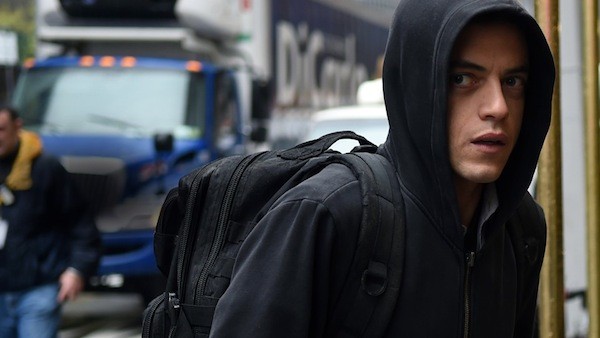Mr. Robot, Season One (2015; various directors, including Sam Esmail, Jim McKay, Tricia Brock and Niels Arden Oplev)—Mass popularity and critical acclaim often ruin good television dramas. If a show is a hit, then it gets renewed for a year and the story goes on. However, if that show continues to be a hit, then it keeps getting renewed over and over and over again—and to hell with characterization, narrative arcs, plausibility, aging actors, you name it. Eventually the business side wins big while the show degenerates into a grotesque fan-service striptease that finally dies of exposure after standing naked and shivering and pathetic for years while every question is answered and every dark corner is disinfected by the light.

So imagine a world where the second season of USA Network’s critically acclaimed Mr. Robot never appears. It’s easy if you try. Let its billowy story threads dangle and twist unimpeded. Let its criminals, agitators and boardroom monsters roam the streets unpunished. Let the person or people behind that one apartment door remain unglimpsed.
Freed from the tyranny of narrative closure, the inaugural season of creator Sam Esmail’s volatile saga about Eliot Alderson (Rami Malek), a hyper-intelligent, highly unstable computer hacker, then becomes the only legitimate heir to the first season of David Lynch’s Twin Peaks and a companion piece to Lynch’s aborted TV pilot-turned-cinematic-masterpiece Mulholland Drive. Visually and thematically, Mr. Robot is about insignificance; its characters are fighting to be seen and heard. Eliot, his friend Angela (Portia Doubleday), and his fellow hackers Darlene (Carly Chaykin) and Mr. Robot himself (Christian Slater) are often shunted to the side in a given shot like forgotten or unfinished documents on a PC desktop. Other characters peep over the bottom edge of the frame like twentysomething Kilroys afraid they will be crushed by the collapse of a vast, visible conference-room ceiling or sucked into the yawning city streets behind them.
But insignificance doesn’t necessarily mean freedom. Most of the images look like they were secretly recorded by hidden cell phones, sleeping computer monitors or futuristic, microscopic surveillance devices hidden in a businessman’s lapel. These visual strategies manufacture a strong undercurrent of dread, fear and paranoia—part murky early David Fincher, part orgy-at-the-mansion-scene from Kubrick’s Eyes Wide Shut—that pools and eddies around even the most banal conversations, creating bizarre horror set pieces out of things like a young man talking to a new mom swaddling a baby on her shoulder. Or is she holding a baby at all?
Repeatedly, Mr. Robot asks what facing this kind of insignificance might do to a person. In Elliot’s case, being pushed aside might encourage them to save the world. Then again, it might lead them to furnish and dwell in worlds of his own making. Both options are simultaneously brave and dangerous.
For plenty of good reasons, I haven’t said much about Mr. Robot’s plot. But the series is rich enough that its numerous twists aren’t the only justifications for its existence. Its vision of computer culture and corporate culture is corrosive and distressing, yet Esmail and his team allow the bigwigs as well as the little guys moments of reflection, vulnerability, and doubt. Which, of course, makes their monstrous decisions and outbursts of callousness scarier still.
So to sum things up: If there’s a better new drama than Mr. Robot this year, I’ll eat my laptop.
Grade: A